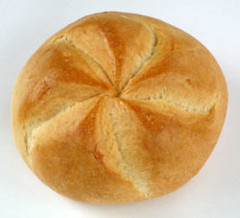Yeast Rolls
Vicki Mendham
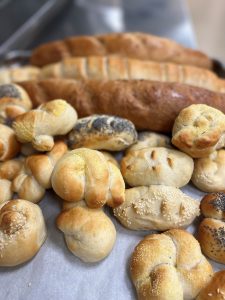
An assorted bread basket, served warm with a compound butter can be a big draw at restaurants. It also has big profit potential. Learning to make an assortment of rolls is a required skill for any baker.
Yeast Roll Size- average size is 1 1/2 ounces but can range from 1 1/4 ounces to 1 1/2 ounces. Example. If you have a one pound press (piece) of dough and cut it into twelve rolls, each roll will be 1.33 ounces each Kaiser rolls used for buns may be 2-3 ounces each.
Object of Makeup Techniques
- Stretch the gluten strands on the surface into a smooth skin
- gluten holds the shape of the roll
- incorrect makeup results in:
- irregular shapes
- splits in the dough
- flattening of the finished product
It is important to scale rolls accurately so the end product is sized appropriately for customer satisfaction and costing purposes and for baking consistency (they do not burn or remain undercooked on the same pan).
Dusting Flour
- lightly to prevent sticking
- light rye or bread flour
- use as little as possible
- excessive flour causes:
- difficult to seal
- flour streaks in baked product
- dryness in final product
After shaping, rolls need to be proofed until approximately double in size. Gently brush with eggwash and sprinkle with seeds or herbs as desired,
Proper Baking
- Bake on parchment paper; may cool on pan
- If in muffin tin then spray the pan and remove from pan to cool
- Bake until golden brown or until internal temperature reaches a minimum of 195 degrees.
Typical Crisp-Crusted and Rye Products
- Round-scale dough as desired. Round on bench with cupped hand.
- Oval -start with round roll and press/ roll until elongated. Use lame to score tops.
- Split-Start with round rolls and press top with a dowel or wooden spoon handle. Typically proofed upside down.
- Crescent Rolls (do not butter)-Roll press of dough into a circle. Cut into equal pieces. Roll pieces up. Put tip on pan so they do not unroll.
Typical Soft Rolls

Knots/Tied-Roll dough into a rope and tie. Place on parchment lined pan.
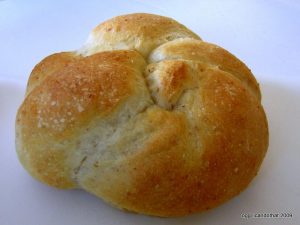
Cloverleaf Rolls-Bake in a muffin Pan; divide dough into 3 small balls and roll. Place in sprayed muffin pan.
Crescent Rolls- Roll press of dough into a circle. Cut into equal pieces. Brush with butter before rolling up. Put tip on pan so they do not unroll.
Parkerhouse Rolls-Round dough and press/roll with a rolling pin or thick wooden dowel. fold pieces together and crease the edge.
Butterflake Rolls-Roll dough into a rectangle. Brush with butter. Cut into strips about 1 1/2 inches wide. Stack 6 strips. Cut into pieces about 1 1/2 inches and put in sprayed muffin pan.
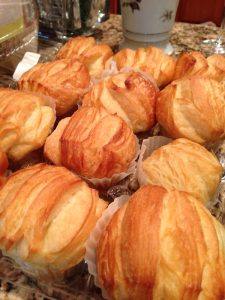
Kaiser Rolls-Use kaiser star marker-press in top of flattened ball of dough; typically use 2-3 ounces of dough depending
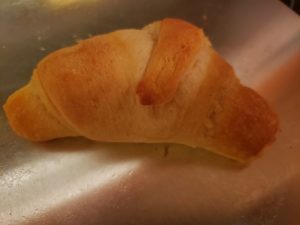
on desired roll size.Typically 2-3 ounces of dough. Use scale for consistency.
